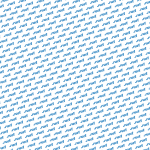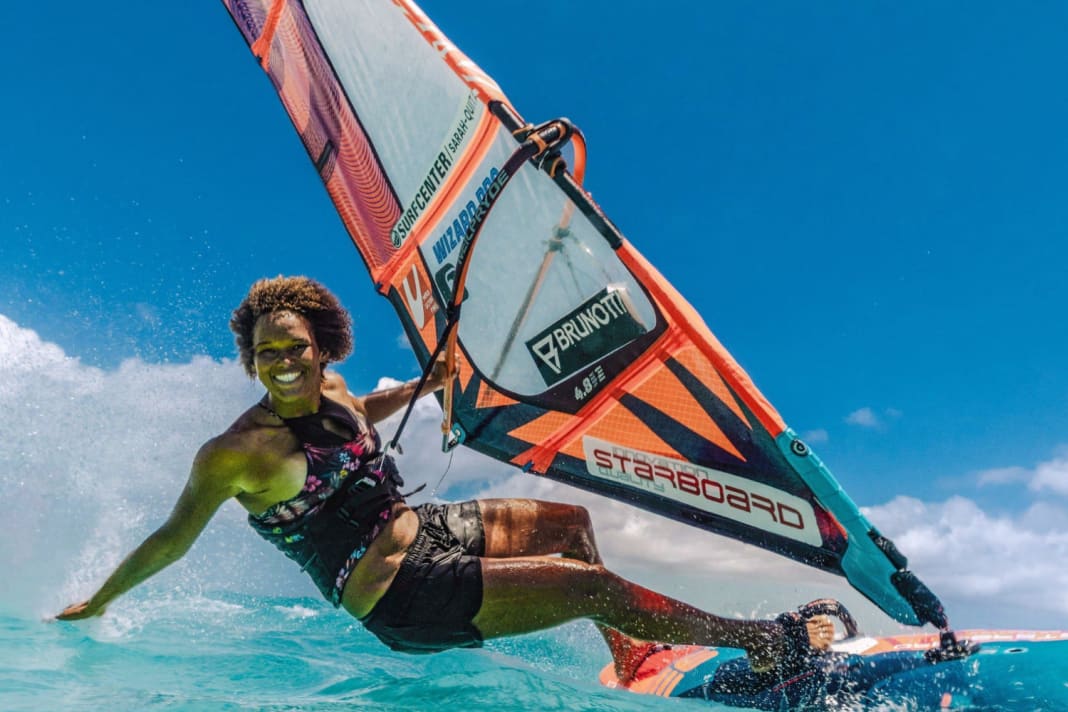





After much pressure, the organisation decided in 2003 at the King of the Caribbean in Bonaire that a then 12-year-old curly-haired girl could take part in the professional event: Sarah-Quita Offringa's debut on the PWA World Tour. She finished in fifth place straight away. "I won 800 dollars," she whispered to a friend in the classroom back on her home island of Aruba.
And just two years later, Starboard boss Svein Rasmussen gave her a board and a ticket to the Canary Islands. She was named Rookie of the Year and came second in freestyle behind Daida Moreno. Another two years later, she won her first world title in Fuerteventura, marking the beginning of a freestyle dominance that continues to this day.
At the beginning of October last year, the Aruban won her second World Championship crown in the waves on Sylt, bringing her provisional tally to a total of 20 World Championship titles: 13 freestyle, 5 slalom and 2 wave. An unrivalled list of successes that underlines her enormous versatility as a windsurfer. Everything she touches seems to turn to gold, although this doesn't always happen automatically for her either.
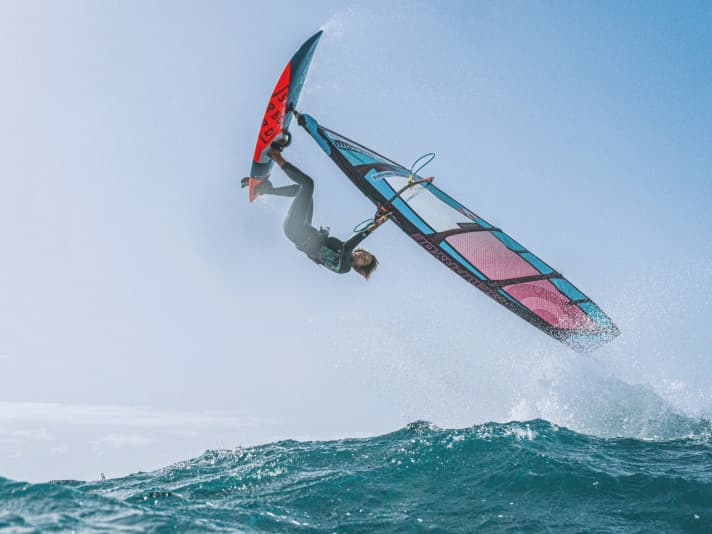
Which of your many world championship titles do you remember most fondly?
My first wave title in 2019 on Maui was very special. The title really means a lot to me, especially because wave is so far removed from my roots - I come from a flat water area. Winning both the Aloha Classic and the world title on Maui was the icing on the cake for me.
There are people who think that I can just win a World Championship title like this, but believe me: it takes a lot of energy and discipline. When you think about everything that can go wrong in a competition like this. It's so unpredictable out there, you have to be very well prepared. I have a total of 20 titles, but they weren't just given to me.
20 titles, three disciplines - you're constantly on the move. Do you ever get to rest?
You know, just recently I sent a cautious email to my sailing sponsor NeilPryde to ask if I could skip the World Cup in Japan. I often feel a bit burnt out at the end of the season. I know it's because I've been travelling too much. In 2017, I even cancelled my slalom career because it was physically too hard. I came home and lay in bed for a week, my windsurfing motivation was completely gone for a few weeks. Those are the times when you have to ask yourself: How many competitions can I manage in a year, why am I doing them and how do I enjoy it the most? The answer for me was to stop slalom and ride more wave and freestyle - with the result that I also won the wave title.
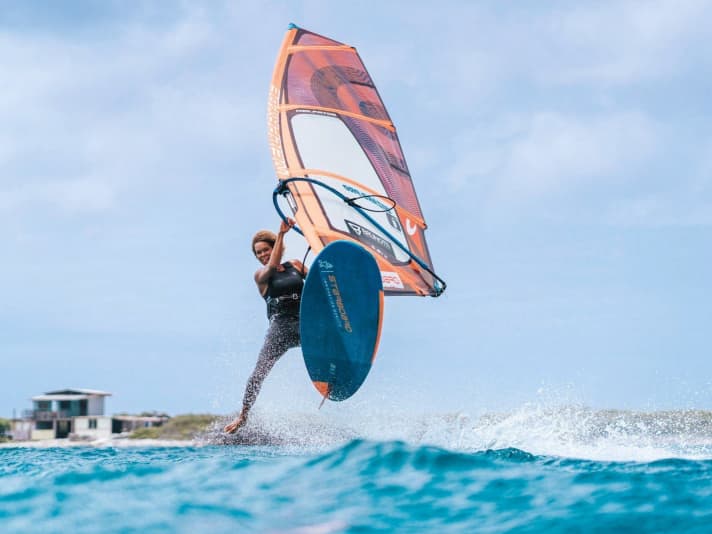
You're 31. What's different now than when you were 21?
I really have the feeling that time is running out. I didn't used to think about it so much, I lived more in the here and now. Now I think more and more often: how can I do everything I want to do in the time I have left as a professional? I still want to do so many things!
How do I get everything I want done in the time I have as a professional?
And you're already doing so much...
Yes, I know, but that's not enough. I want to see a lot more, get much better at windsurfing, for example shredding the waves properly. But how long can you keep it up as a woman when you consider that you might want to have children at some point? I have the feeling that there really is a time limit. Both in terms of physical ability - and that you simply have to start looking a bit more into the future. How you're going to earn money later, after your sporting career, with family and so on. I'm a bit more goal-orientated now than I was then. Targeted training or certain trips that I really want to do. I'm much more mindful with my time because I feel like I can't waste any more time.
How many years are we talking about?
I think it's cut-off time at 36. So I have about five years left to really do what I want to do in windsurfing, and that's going super fast. The question is: what do I want to get out of it now and what do I do after my competitive career? I've had some really great years, but in terms of competing, there are a lot more years behind me now - than ahead of me.
Do you already have answers to these questions?
I think about it a lot. There will be opportunities, but I don't really see them yet. I'm still focussing so much on the sport. Finances are one of those things. I make my living as a professional windsurfer and I've never made money any other way. I've given a few windsurfing lessons here and there and studied for a degree, but I've never done anything with it. I've never had an office job to gauge whether I could do it and how much I would earn. After such a free life, how am I ever going to do an office job?
I never used to think about it, but now I feel a bit more pressure financially too. I'm older and I'm building my own house in Aruba. Then I think: Oh man, I have to keep performing well. What would happen if I stopped competing? How will I support myself? Should I then look for something that I don't have the same passion for? But what can I do to earn money?
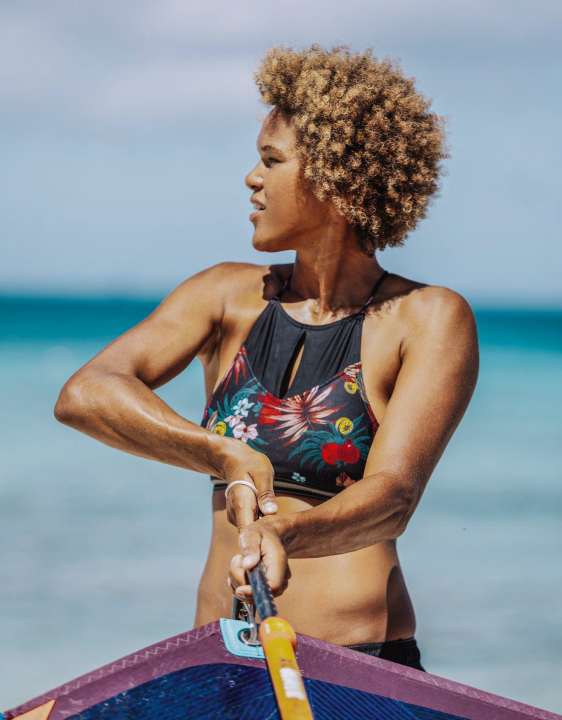
Does it also play a role that as a windsurfing pro you are basically a one-person operation in most cases? That certainly doesn't make it any easier.
Absolutely. I don't have a fixed salary, which makes it difficult to get a mortgage, for example. And I don't earn enough to have a manager, so I have to arrange a lot of things myself. It gives you a lot of freedom, but it's also an uncertain life.
To come back to one of your own questions: What else would you like to do in your career?
I would always have liked a slightly better mix. I'm competitive and enjoy competing. And I also need that to have a guideline, a goal on the horizon. But I would also like to do more individual journeys. One of those adventures that Thomas Traversa does: chasing waves in Namibia, or something like that. That you simply pick out your own personal dream conditions and fly off when the forecast is good.
What's stopping you?
I would first have to ask my sponsors how they would feel if I did fewer competitions - and whether they would still support me as much. The competition calendar has long played a major role in determining what my year looks like. I know where I stand, when I have to be ready and when I have time for my own adventures. Competitive surfing has always been what I'm good at. My other plans, for example, to focus more on special trips to extraordinary places and deliver good content from them, also mean that I have to start over and learn how best to do that. That would be pretty exciting.
There was no freestyle competition for women on the World Tour last season - and therefore no world champion title to be awarded. What was that like for you?
It's obviously terrible for the development of the sport and the other women who take part in it. I don't really care whether I win another title or not. I have 13 freestyle titles, I don't have to prove myself anymore. I need competitions for myself, to get better, to set myself goals. Although I rarely surf at my highest level in a competition. My goal in windsurfing is generally to do the sickest tricks. But I mainly land them in free riding and not in competition. When I'm in Brazil for a month, with all the guys riding around me, my level is at the top. During a competition, it tends to go back a step or two - I haven't had to surf at my highest level very often.
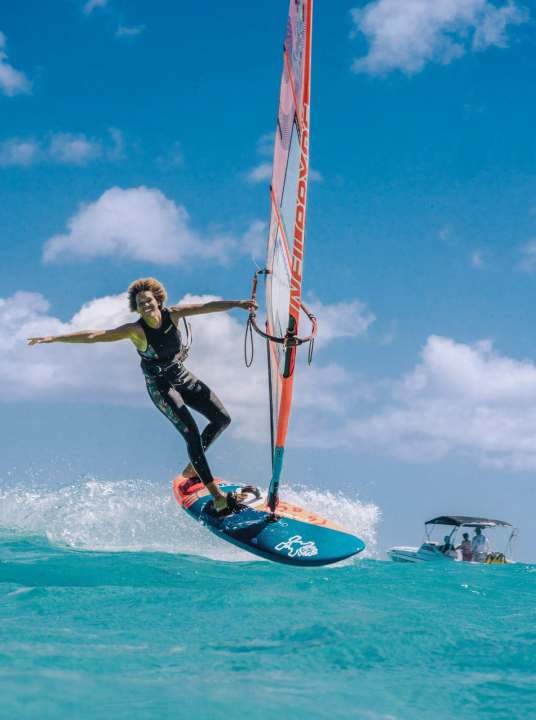
What drives you after all these successful years in freestyle?
My drive in freestyle and in windsurfing in general is to show that we women can also surf at a high level. I've always been respected, but I've also heard so many bad comments from men that the general level of women is bad: women can't do this or that. And that really means a lot to me. My goal was always to raise the level. Also to gain respect from the men. No matter whether it's slalom, freestyle or wave. Not just for me, but also for the other women. I think if one person takes that step forward, the others will follow.
I've heard so many rubbish comments from men.
But the level of women is lower than that of men, isn't it?
Yes, the level is lower than that of men, but you can't just say that women are bad. You also have to look at the background: Women who don't get a budget for equipment and have to pay for their own trips. Many work or study all year round and surf on the side. How can you compare a full-time job with part-time - or even less? There are many men who have thrown themselves fully into windsurfing because they have been given the opportunity to do so. That automatically leads to a higher level.
I've also realised more and more in recent years that I'm pretty spoilt. I live in Aruba, have always had sponsors and can get out on the water whenever I want. I've been doing what I really want to do for 13 years! Some people don't realise what they like until much later, I've always been able to do that. This realisation and the idea that it is finite sometimes makes me a little melancholy. I don't really want it to end.
What is your favourite thing about life on the professional World Tour?
Everything is so unpredictable. The people on the world tour are such a nice, mixed bunch, with whom you travel to strange places and experience crazy things. That creates lots of wonderful memories.
Can you give an example?
The fact that we end up in a karaoke bar in Korea and Finian Maynard is singing and swinging his hips a little later: you don't necessarily expect that. Since 2016, we really have a core group of ladies with whom I have a lot of fun. Oda Johanne, Lina Erpenstein, Maaike Huvermann - these are perhaps the people I see most often in a year. They really do feel a bit like a family. Sometimes, for example, you have very difficult conditions on the water that you have to face together. Getting through something like that together brings out that certain family feeling.
Asia is known for idolising and adoring celebrities. What is it like for you as a well-known windsurfer?
The last time I was in Japan, I was stopped every ten metres to have my photo taken. It's the same on Sylt, by the way. I've got used to it by now, but I have to do my best when people come up to me. I'm in the limelight because I'm good at what I do, but I never actively put myself in the spotlight. I see myself more as a backstage person. I stand out with my hair, but I'm actually quite shy.
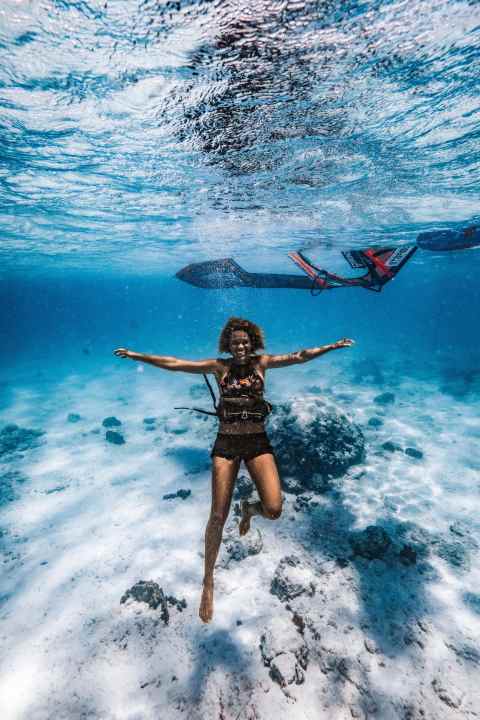
As one of the sport's figureheads, are you currently able to make a good living from windsurfing?
Yes, I can live off the money I get from the sponsors. But if I don't win any competitions, I won't have any more money. The budget is good, I don't have to worry about flying anywhere. But to be able to save a little, I have to win competitions so that I get prize money - and my bonus, for example, if I'm in the top three at the end of the year.
For me, the question is whether I would earn just as much money if I did fewer disciplines but promoted the sport differently. That's where I want to go.
You are Sarah-Quita Offringa, 20-time world champion. I think that should work, don't you?
I've been thinking about it a lot over the last few months. I think I've reached a point where I'm going to put a bit more energy into it. And yes: I'm Sarah-Quita, but I'm also a woman. And we simply earn less than the men. I do three disciplines and still earn less than the best male slalom skier. In the end, I work for my sponsors - and they decide what they want to pay. I should focus more on companies outside of windsurfing that perhaps don't have such an old-fashioned way of thinking. They don't look so much at men or women, but only at the value of the person.
You have started a coaching project together with your freestyle colleague Oda-Johanne. Can you tell us something about it?
We had initially planned a camp in Greece, but it was cancelled due to the coronavirus. And how can we still coach people if we can't meet them physically? Online, of course! That's why we organised the Windsurf University with the idea of explaining to people how we train ourselves. And we do this mainly by doing a lot of video analysis. We give the students a concrete plan for a specific manoeuvre before they go into the water and practise. This makes the learning process much more effective. A great project that we will continue to work on.
You've also been seen on the iQFOiL from time to time recently. Are you now also competing in Olympic windsurfing?
I find iQ-Foiling more and more interesting. But I quickly realised how much time I would have to invest in it to get to the top. If I were to enter the Olympics now, it would mainly be because people expect me to. Here on the island, they've been asking me for 15 years why I'm not competing in the Olympics. Then I always have to explain that I'm too heavy for RS:X. In that respect, iQ is actually perfect for me. But what I'm doing now is just too much fun, I don't want to miss out on it. There are things in the wave that I really want to achieve, such as the double forward or riding bigger waves. I generally prefer to do tricks and practise new techniques and moves. But the challenge would be exciting, it's tactically fun on the iQFOiL. So yes, maybe in a few years' time, if I still want to race.
Do you always feel like windsurfing? Or does it sometimes feel like work?
I almost always feel like windsurfing, but if I don't feel like it, I don't go. I do almost everything by feel. I don't mind not going on the water for a day. I have to do things because I feel like it.
What do you like to do in your free time?
Kitesurfing, tennis, cycling - and windsurfing, of course. That's training, but also leisure time. When I'm in Aruba, I spend a lot of time at home. I think it's cool to sit in the garden and read a book. Or watering and pruning the plants. But during the wind season, I naturally spend a lot of time on the beach and often have two sessions a day. I go to the gym in the morning, then usually go windsurfing - and in the afternoon there's often another windsurfing or kitesurfing session.
Can you give us an outlook? An ideal image when you are 80 years old?
I don't want to say Hawaii per se, but I live somewhere where there are waves. Until then, I did everything I wanted to do: nice wave trips to Chile, Mexico or Peru. Finding the longest wave, things like that. I hope that I'll still be fit when I'm 80 so that I can go surfing with my grandchildren. I probably still drink too much coffee. During the day, I'm busy with my plants - and my grandchildren come to visit.
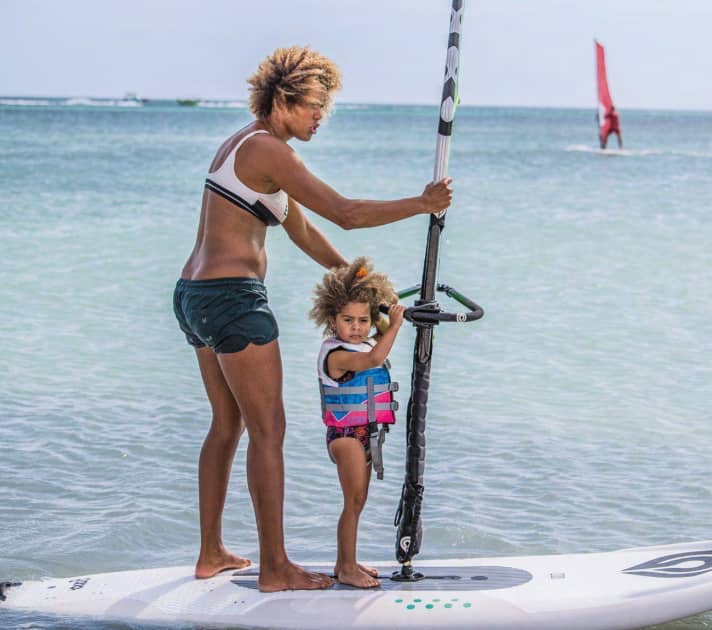
What is the best anecdote from that time that you will tell them?
Maybe I'll tell them the stories from the year I shot my film "Cabeibusha" with Julian Robinet. The trip to Australia for the film was crazy - a real adventure. We never knew exactly what we were going to do the next day. A six-hour drive to nowhere. Then your car breaks down and you have to sleep on the side of the road while all sorts of lorries speed past. Or that time when I was on the water with photographer John Carter in Geraldton until the last minute for a photo shoot and he had to go straight to the airport afterwards. A five-hour drive in Dieter Van der Eyken's hire car. We barely made it - and afterwards Dieter was sent a speeding ticket with a photo of John Carter (laughs).
Windsurfing lets you do things that a normal person would never do.
As you always say: little adventures.
Yes, it's all the things that come with windsurfing that you do for it - and experience before and after. Nobody in their right mind is still in Geraldton when they have to fly out of Perth on the same day. A normal person has already packed their bags three days before and is at the airport two hours before departure. Windsurfing lets you do things that a normal person would never do. Isn't that fantastic? Sarah-Quita 2.0? The head of curls is definitely already there.
